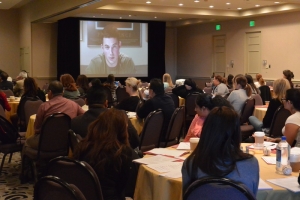Training Providers on Sex and Intimacy Issues Facing Military Personnel
March 02, 2015 / by Claudia Bustamante- Research
Recent research by the USC School of Social Work has found that even though sexual functioning problems are significantly higher among military service members than civilians, very few are receiving treatment.
These problems, which are strongly related to the physical and psychological health of service members, are often overlooked by both military populations and clinicians, making it yet another invisible wound of war.
To help address this gap between the needs and services provided, the Center for Innovation and Research on Veterans & Military Families held a conference Feb. 13, where it unveiled a toolkit to help bring awareness to these issues and train providers on how best to approach the subject of sex and intimacy with their military clients.
“If behavioral health providers are not asking about sex, then they won’t know there’s a problem, and it will not be addressed,” said Sherrie Wilcox, research assistant professor and lead on the center’s study on sexual functioning as a result of military service.
Untreated sexual functioning problems are a concern.
The USC study found 33 percent of male military service members aged 21-40 reported erectile dysfunction, a rate more than three times that of similarly aged civilians. Those with post-traumatic stress disorder, depression, anxiety and suicidal thoughts were even more likely to have erectile dysfunction and other sexual functioning problems. Overall, service members with sexual functioning problems experienced lower quality of life; however, only 12 percent reported actually receiving treatment.
“Sexuality is an integral and important part of all human experience, and yet clinicians are often reluctant to talk to clients about this aspect of their lives,” said Doni Whitsett, clinical professor and certified sex therapist. “The reluctance is partly because they’re uncomfortable with the topic and partly because they don’t know what to do with the information they receive.”
Health providers receive limited or no training on sexual functioning and intimacy, especially as it relates to military populations. Though not unique to military populations, service members are exposed to physical and psychological challenges that can exacerbate problems and further complicate a successful transition home.
To help instruct providers and students, the toolkit includes educational video vignettes depicting different types of sexual functioning problems, physical and psychological injuries, and how military culture further informs these issues. The toolkit also provides strategies for providers to discuss sexual issues with clients.
The conference brought together experts who could inform the audience of multiple aspects of sex and the military that they should be considering with clients, including the genitourinary injuries that have occurred in the modern battlefield, military sexual trauma among male service members, the breakdown of communication and emotional connection in relationships, and how medication for mental health conditions can create adverse sexual side effects.
The conference and toolkit were funded through the $650,000 gift given by the Iraq Afghanistan Deployment Impact Fund via the California Community Foundation to study “The Other Invisible Wounds: Sexual Functioning as a Result of Combat Service.”
To reference the work of our faculty online, we ask that you directly quote their work where possible and attribute it to "FACULTY NAME, a professor in the USC Suzanne Dworak-Peck School of Social Work” (LINK: https://dworakpeck.usc.edu)
